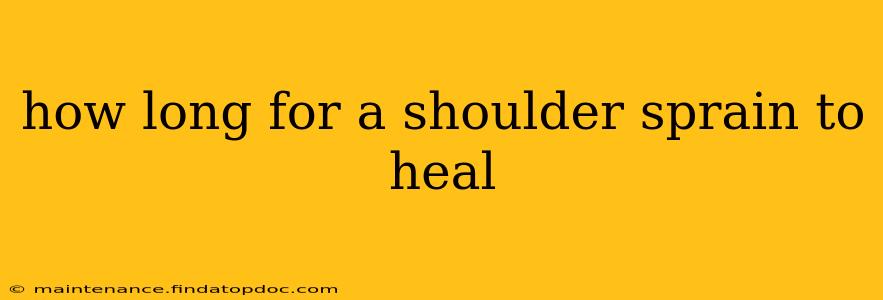How Long Does It Take for a Shoulder Sprain to Heal?
A shoulder sprain, also known as a shoulder strain, involves the stretching or tearing of ligaments in the shoulder joint. The healing time varies significantly depending on several factors, making it impossible to give a single definitive answer. This article will explore the typical healing timeline, influencing factors, and what you can expect during recovery.
What is a Shoulder Sprain?
Before diving into healing times, it's crucial to understand what constitutes a shoulder sprain. The shoulder joint is a complex structure, relying on ligaments, tendons, and muscles for stability and movement. A sprain specifically refers to damage to the ligaments—the tough, fibrous tissues that connect bones to each other. The severity of the sprain ranges from mild stretching to a complete tear.
How Long Does It Typically Take to Heal?
Generally, a mild shoulder sprain might heal within a few weeks to a couple of months with proper rest, ice, and physical therapy. This timeframe allows the ligaments to repair themselves naturally.
A moderate to severe shoulder sprain, however, often requires a longer recovery period, potentially lasting several months or even longer in some cases. This is because more extensive ligament damage necessitates more intensive treatment and rehabilitation. Complete tears may even require surgical intervention, significantly extending the healing process.
What Factors Affect Healing Time?
Several factors influence how quickly a shoulder sprain heals:
- Severity of the injury: A minor sprain heals much faster than a complete ligament tear.
- Age: Younger individuals generally heal faster than older individuals due to increased tissue regeneration capabilities.
- Overall health: Pre-existing conditions, such as diabetes or autoimmune diseases, can impede healing.
- Treatment adherence: Following your doctor's recommendations, including rest, physical therapy, and medication, is crucial for optimal healing.
- Individual healing capacity: Everyone heals at a different rate, and some individuals naturally recover quicker than others.
What are the Stages of Healing?
The healing process typically involves several stages:
- Inflammatory phase (days to weeks): This initial phase involves pain, swelling, and inflammation. Rest and ice are crucial during this stage.
- Repair phase (weeks to months): The body begins to repair the damaged ligaments. Physical therapy plays a vital role in this stage.
- Remodeling phase (months): The scar tissue strengthens, and the shoulder regains its full functionality. Continued physical therapy is essential for regaining full range of motion and strength.
How Can I Speed Up the Healing Process?
While the natural healing process takes time, you can support recovery through:
- Rest: Avoid activities that aggravate the injury.
- Ice: Apply ice packs to reduce swelling and pain.
- Compression: Use a compression bandage to minimize swelling.
- Elevation: Keep your shoulder elevated to reduce swelling.
- Physical therapy: A physical therapist can guide you through exercises to restore strength and range of motion.
- Medication: Your doctor may prescribe pain relievers or anti-inflammatory drugs.
When Should I See a Doctor?
It's essential to seek medical attention if you suspect a shoulder sprain. A doctor can diagnose the injury's severity and recommend the appropriate treatment. You should see a doctor immediately if you experience:
- Severe pain
- Significant swelling
- Inability to move your shoulder
- Deformity of the shoulder
- Numbness or tingling in your arm or hand
Can a shoulder sprain become chronic?
While most shoulder sprains heal completely, if not treated properly or if the injury is severe, it can lead to chronic pain and limited mobility. This emphasizes the importance of seeking early medical attention and diligently following your doctor's treatment plan.
This information is for general knowledge and does not constitute medical advice. Always consult a healthcare professional for diagnosis and treatment of any medical condition.
